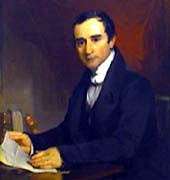John Sergeant (politician)
- For other persons named John Sergeant, see John Sergeant (disambiguation)
| John Sergeant | |
|---|---|
 | |
| Member of the U.S. House of Representatives from Pennsylvania's 1st district | |
|
In office March 4, 1815 – March 3, 1823 | |
| Member of the U.S. House of Representatives from Pennsylvania's 2nd district | |
|
In office March 4, 1827 – March 3, 1829 | |
| Preceded by | Thomas Kittera |
| Succeeded by | Daniel H. Miller |
|
In office March 4, 1837 – March 3, 1841 | |
| Member of the Pennsylvania House of Representatives | |
|
In office 1808-1810 | |
| Personal details | |
| Born |
December 5, 1779 Philadelphia, Pennsylvania |
| Died |
November 23, 1852 (aged 72) Philadelphia, Pennsylvania |
| Political party |
Federalist National Republican Whig |
| Spouse(s) | Margaretta Watmough |
| Alma mater | Princeton University |
| Profession | Law |
John Sergeant (December 5, 1779 – November 23, 1852) was an American politician who represented Pennsylvania in the House of Representatives. He was born in Philadelphia to Jonathan Dickinson Sergeant and Margaret Spencer. He came from a family of American politicians, including his father, his grandsons, John Sergeant Wise and Richard Alsop Wise, and his great-grandson, John Crain Kunkel.
Sergeant was the nominee of the National Republican Party for Vice President of the United States in 1832 on a ticket with Senator Henry Clay, which was defeated.
Private Life and Education
Sergeant was educated in the common schools and at the University of Pennsylvania at Philadelphia. He graduated from Princeton College in 1795. He became a lawyer and, after being admitted to the bar in 1799, practiced law for fifty years.
Public service
In 1800 Sergeant became deputy attorney general for Philadelphia and then commissioner of bankruptcy for Pennsylvania the following year. He was a member of the Pennsylvania State House of Representatives from 1808 to 1810. He was elected as a Federalist to the United States House of Representatives to fill the vacancy caused by the death of Jonathan Williams. He was re-elected three times, serving from October 10, 1815 to March 3, 1823, and managed to reach the position of chairman of the United States House Committee on the Judiciary. Sergeant was a strong backer of Henry Clay's American System and the Second Bank of the United States in Congress, and even traveled to Europe to negotiate loans to the Bank. He was also a strong opponent of slavery who voted against the Missouri Compromise. He then retired (albeit temporarily) from Congress.
In 1825, he was president of the Pennsylvania Board of Canal Commissioners. The following year, he was an envoy to the Panama Congress, and then was returned to the U.S. House of Representatives for the term starting March 4, 1827. He failed re-election to the following term and left Congress for the second time on March 3, 1829. He then became legal counsel to the Bank of the United States.
Vice Presidential Candidate
Sergeant was Henry Clay's running mate on the National Republican ticket during the 1832 presidential election but lost to Andrew Jackson and Martin Van Buren in a landslide and again retreated from public life.
After his Vice Presidential candidacy, he returned as president of the Pennsylvania constitutional convention in 1838, and then was elected as a Whig to the U.S. House of Representatives. He served this last time from March 4, 1837 until he resigned on September 15, 1841, and again was chair of the Committee on the Judiciary for the 1837 – 1839 term. He returned to his law practice, declining offers of a cabinet or diplomatic position from the new Whig administration.
In 1844 he was considered for the Whig vice presidential nomination, to once again run with Clay, but at the convention lost out to Theodore Frelinghuysen.
Sergeant died in Philadelphia on November 23, 1852 and was interred at Laurel Hill Cemetery.
Family
On June 23, 1813 he married Margaretta Watmough, daughter of James Horatio Watmough and Anna Carmick. With Margaretta he fathered ten children, all but one surviving infancy. His oldest daughter, also named Margaretta (June 26, 1814 – January 7, 1886) married Major General George Meade, Commander of the Union Army of the Potomac from the Battle of Gettysburg until the end of the Civil War. Another daughter, Sarah (September 24, 1817 – October 14, 1850) married Henry A. Wise. His youngest son, William (August 29, 1829 – April 11, 1865) served in the Civil War and was mortally wounded at the Battle of White Oak Road.
Sources
- United States Congress. "John Sergeant (id: S000246)". Biographical Directory of the United States Congress.
- The Political Graveyard
- Accessed October 26, 2008
- Accessed October 26, 2008
